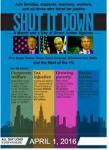Chicago teachers (again) rewrite a playbook stacked against labor

The Chicago Teachers Union (CTU) strike April 1 is not primarily about increased school funding, standardized testing, pensions for teachers, or even just corporate taxation, though the union is fighting for all of these. The strike is about democracy, especially who owns our society’s resources and how decisions about those resources are made.
CTU has shown us – again – what real democracy looks like. Under an Illinois law designed to undercut teachers’ rights as workers to withhold their labor, 75 percent of the union’s active members must authorize a strike. CTU met and surpassed that bar with 92% of CTU members voting on the issue and 96.5% of those voting endorsing strike action. Its representative body, the House of Delegates, voted by a margin of 4-1 to call the strike April 1.
Is it democratic that the union demands that all members respect the decision of the vast majority of members to strike? Insisting on solidarity in action after a democratic vote is unusual in our society. In contrast to the cut-throat competition and dog-eat-dog individualism that capitalism cherishes, unions are based on the idea that one’s own well-being is bound up with the fate of others. Collective action depends on trust and a strong sense of shared interest, ideals that underlie democracy.
The CTU has asked its members to take an action that its opponents describe as illegal. In doing so, the union has made interpretation of its contract a political struggle rather than one that is fought only in the courts. Labor unions have been seriously weakened by acceding to the rules in a political game rigged by wealthy, powerful elites who own most politicians. In this one-day job action the CTU reminds labor that winning collective bargaining, the 40 hour week, overtime, and social security required direct action. Unions had to engage in activities that were defined as illegal and cast as immoral by those who controlled business, government, and often religious institutions.
Budget cuts have hurt so many children, especially those most in need of the best services, exposing as crocodile tears the laments of officials who fault Chicago teachers for denying poor, vulnerable children a day of instruction. Although the media hope parents will be turned against teachers by a walkout that targets school funding, it’s unlikely parents whose communities have been devastated by school closings and whose kids have lost weeks of learning to testing will agree. Here too the CTU has shown what democracy looks like by developing strong collaborations with other unions and social justice groups, from low-wage fast food workers to Black Lives Matter.
The Chicago Tribune's editorial dismissal of the CTU’s strike as a “tantrum” is a telling indication of the frustration the city’s most powerful business interests and Mayor, Rahm Emanuel experience in dealing with a union that won’t play the usual game of living with cuts and defeats while waiting for friendly politicians to be elected Although Emanuel and his backers have won victories, primarily school closings, the CTU has with each defeat developed new relationships with parents and community. Because the union has built strong support at the building level, teachers (mostly women) are not so easily cowed by threats. And few parents from communities of color buy the rationale for tax giveaways that rob the schools of needed revenue, again because the union has worked so diligently in making the political case for fair taxation that pays for school expenditures.
Chicago’s teachers are not alone in redefining the rules of engagement with governments over school funding and ownership of public education. UK teachers will shortly engage in a national one-day strike, followed by local strikes throughout the summer. From South Africa to Hungary, Kenya to India, teachers, parents and students are resisting dismantling of public education, the process of dispossession. What makes the CTU strike singular is that it occurs in the U.S. and so implicitly challenges the rest of U.S. labor to break the old rules, working with those most disempowered and most affected by brutal cuts and injustice to fight back as allies.
CTU’s one-day walkout is an April Fool's Day present to US capitalism. Surprise! We’re fighting back!
Lois Weiner is a professor of education at New Jersey City University, where she directs the Urban Education and Teacher Unionism Policy Project. You can follow her on Twitter and Facebook and read her blog at New Politics.
A version of this article appears at Jacobin.